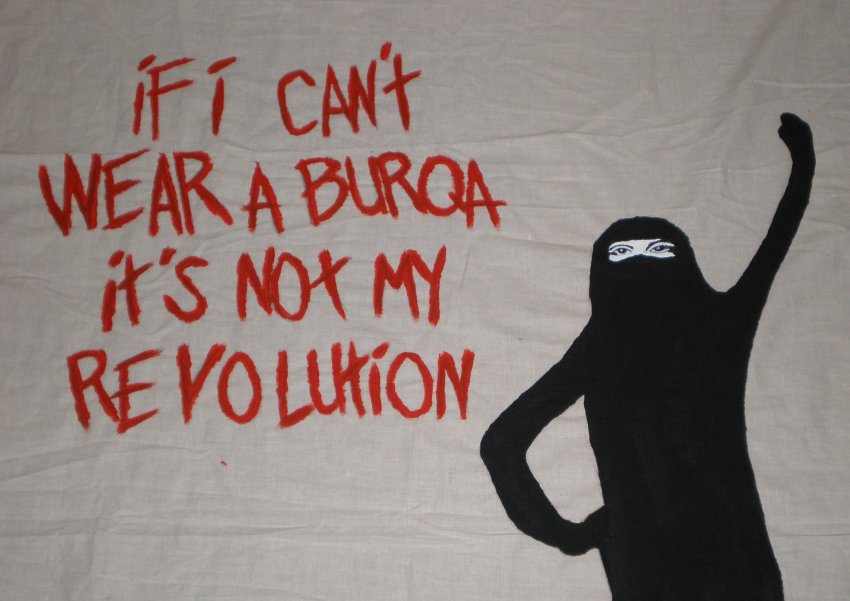
On September 23, the Daily Telegraph reported on a wall mural in the Sydney inner-west suburb of Newtown by artist Sergio Redegalli with the slogan “Say no to burqas”.
Redegalli’s mural has sparked protests by local residents who have condemned it as racist. Sydney Socialist Alliance activist Kiraz Janicke says Redegalli’s piece “has no other value than to promote racism”. She has responded with an artwork of her own — a submission to the Live Red Art Awards, titled “Burqa revolution”.
Below, Janicke argues that banning the burqa (a veil covering the entire body, with a mesh over the eyes), or other forms of Islamic dress worn by some Muslim women that cover the face, will hinder true women’s liberation.
* * *
“Burqa revolution” is a contribution to the current debate about the burqa and the disturbing rise of anti-Muslim extremism, not only in Europe and around the world, but also here in Australia.
In the New South Wales Legislative Council, arch-fundamentalist Christian MLC Fred Nile has introduced a private member’s bill seeking to ban the wearing of the burqa.
This anti-Muslim extremism is a product of a sustained ideological campaign of Islamophobia by the media and mainstream politicians — not only to bolster support for the wars in Afghanistan and Iraq, but also to scapegoat a sector of the population for the growing social problems stemming from the crisis of capitalism itself.
The debate surrounding the burqa cannot be abstracted from this context.
A recurring theme of this ideological campaign to convince us that Muslims are "alien" to the "Western way of life” is that Islam oppresses women.
Thus we have “feminist” arguments being used to justify the bloody war in Afghanistan, which has killed thousands of innocent women and children, as a mission to "liberate" women, and hypocritical rhetoric about "defending women's rights" from politicians who at the same time are attacking women's rights and services here in Australia.
Racialisation of sexism
Not only would banning the burqa constitute a violation of religious freedom, it is also racist because it holds only one sector of society responsible for sexism: Muslims. This false counter-position of Islam (as an oppressor of women’s rights) vs the enlightened West (as defenders of women’s rights), serves to distract from the inherent sexism of our own society.
The height of hypocrisy is reached by those who, claiming to defend women's rights, have attacked Muslim women. The racist thugs at Cronulla during the 2005 riots, in their effort to “defend women”, chased down a 14-year-old girl and ripped off her hijab.
As US socialist and feminist Sharon Smith argues, “veiled or unveiled, women’s oppression is universal”.
Some progressives and feminists may find “Burqa revolution” confronting because it portrays a woman demanding the right to wear a burqa — something commonly viewed as symbol of women’s subjugation.
However, as a recent 2000-strong rally in western Sydney supporting the right to wear a burqa shows, for many Muslim women wearing a burqa, niqab or hijab is an affirmation of their identity and an act of protest against the prevailing Islamophobia.
My artwork challenges the argument that banning the burqa can contribute to women’s liberation. Liberation is not something that can be imposed, but must be won through a process of self-determination.
If you accept that the state has the right to ban the burqa, then you also accept that it has the right to force women to wear it — it’s the same logic! Either way, allowing the state to regulate what women wear takes away their agency.
There is no contradiction in campaigning against attempts to ban the burqa and supporting those women who are fighting against being forced to wear it overseas. It’s about a woman’s right to choose.
Some women are obliged by social, religious or family pressures to wear a burqa or similar forms of Islamic dress, but state intervention is not the solution. Banning women from wearing symbolic clothing will not change their status or the underlying pressures upon them. Real equality for women requires economic independence and the ability to make a full range of choices about the way they live their lives.
“Burqa revolution” is also a message to the left that it needs to be inclusive. By falling in behind a ban, the left would cut itself off from having a discussion with Muslims who are our allies in the campaigns against racism and war and from winning them to our perspectives through democratic debate.
Anyone who truly supports women's rights needs to reject the fake "feminism" of the right. The best way to fight sexism, like racism, is to encourage women and oppressed minorities to fight to defend their rights through collective action.
Building the movement to stop the wars in the Middle East and to reject the sexist and racist propaganda of the politicians and media is what will in reality create a better world for women, and for all.
Comments
jeffare@gmail.com replied on Permalink
helen.said@optu... replied on Permalink
Kate replied on Permalink
sergio replied on Permalink
BroadBlogs replied on Permalink
Secular replied on Permalink